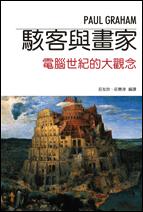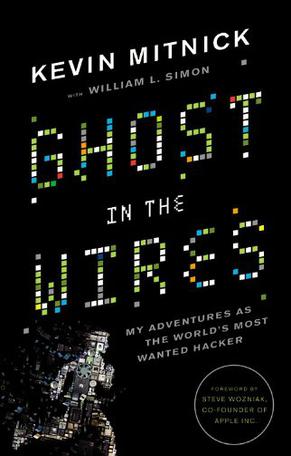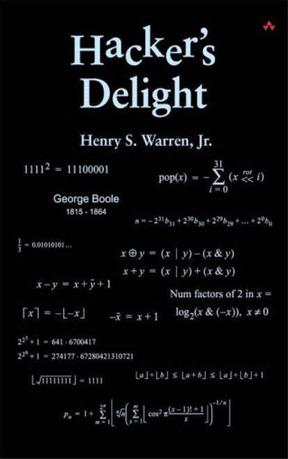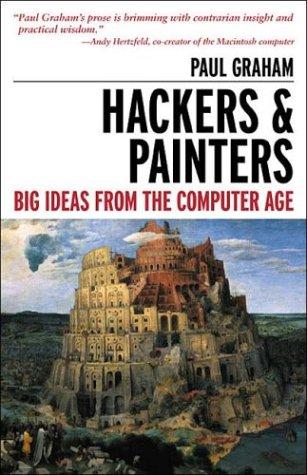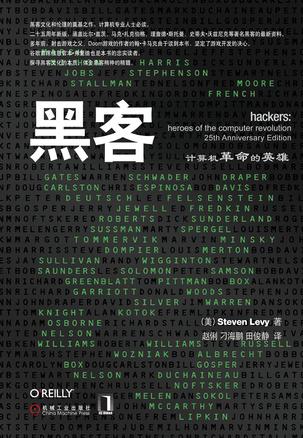欢迎来到相识电子书!
标签:hacker
-
駭客與畫家
本書檢視駭客的世界,以及駭客活動背後的動機。在這個日漸電腦化的世界裡,駭客是個帶有多重意義的名詞,它對創意使用者帶來尊崇,也對規矩破壞者帶來鄙視意味。Paul Graham 的散文引領讀者瀏覽他筆下的駭客世界,一個聰明才智泛流的新荒野。 為什麼一個唸不完高中的孩子,最後卻晉身為世上最有權勢的人?科技是否將建立出新的鴻溝,一端是懂得使用科技的人,一端是不會使用的人?微軟是否將接掌網際網路?我們該拿垃圾郵件怎麼辦?這些都是本書討論的議題。 如果你想瞭解駭客心理在想什麼,這本書可以回答你的問題。如果你已經是個駭客,或許,你能從這本散文集中發現自己的身影。 -
Hackers: Heroes of the Computer Revolution
http://www.stanford.edu/group/mmdd/SiliconValley/Levy/Hackers.1984.book/ Hackers: Heroes of the Computer Revolution (ISBN 0385191952) is a book by Steven Levy about the hacker culture. It was published in 1984 in Garden City, New York by Anchor Press/Doubleday. Levy describes the people, the machines, and the events that defined the Hacker Culture and the Hacker Ethic, from the early mainframe hackers at MIT, to the self-made hardware hackers and game hackers. However since the book was written in the 1980s, there is no mention of the network hackers of the 1990s. Below is a summary of each chapter of the book, mentioning some of the principal characters and events. -
0day安全:软件漏洞分析技术
本书分为4篇17章,系统全面地介绍了Windows平台缓冲区溢出漏洞的分析、检测与防护。第一篇为常用工具和基础知识的介绍;第二篇从攻击者的视角出发,揭秘了攻击者利用漏洞的常用伎俩,了解这些知识对进行计算机应急响应和提高软件产品安全性至关重要;第三篇在第二篇的基础上,从安全专家的角度介绍了漏洞分析和计算机应急响应方面的知识;第四篇则站在软件工程师的角度讲述如何在开发、测试等软件生命周期的各个环节中加入安全因素,以增强软件产品的安全性。 -
Ghost in the Wires
Kevin Mitnick, the world's most wanted computer hacker, managed to hack into some of the country's most powerful - and seemingly impenetrable - agencies and companies. By conning employees into giving him private information and maneuvering through layers of security, he gained access to data that no one else could. The suspenseful heart of the book unfolds as Mitnick disappears on a three-year run from the FBI. He creates fake identities, finds jobs at a law firm and hospital, and keeps tabs on his myriad pursuers - all while continuing to hack into computer systems and phone company switches that were considered flawless. A modern, technology-driven adventure story, GHOST IN THE WIRES is a dramatic account of the joy of outsmarting security programs, the satisfaction of code-cracking, and the thrill of unbelievable escape. -
Hackers
This 25th anniversary edition of Steven Levy's classic book traces the exploits of the computer revolution's original hackers -- those brilliant and eccentric nerds from the late 1950s through the early '80s who took risks, bent the rules, and pushed the world in a radical new direction. With updated material from noteworthy hackers such as Bill Gates, Mark Zukerberg, Richard Stallman, and Steve Wozniak, Hackers is a fascinating story that begins in early computer research labs and leads to the first home computers. Levy profiles the imaginative brainiacs who found clever and unorthodox solutions to computer engineering problems. They had a shared sense of values, known as "the hacker ethic," that still thrives today. Hackers captures a seminal period in recent history when underground activities blazed a trail for today's digital world, from MIT students finagling access to clunky computer-card machines to the DIY culture that spawned the Altair and the Apple II. Amazon.com Exclusive: The Rant Heard Round the World By Steven Levy Author Steven Levy When I began researching Hacker s--so many years ago that it’s scary--I thought I’d largely be chronicling the foibles of a sociologically weird cohort who escaped normal human interaction by retreating to the sterile confines of computers labs. Instead, I discovered a fascinating, funny cohort who wound up transforming human interaction, spreading a culture that affects our views about everything from politics to entertainment to business. The stories of those amazing people and what they did is the backbone of Hackers: Heroes of the Computer Revolution . But when I revisited the book recently to prepare the 25th Anniversary Edition of my first book, it was clear that I had luckily stumbled on the origin of a computer (and Internet) related controversy that still permeates the digital discussion. Throughout the book I write about something I called The Hacker Ethic, my interpretation of several principles implicitly shared by true hackers, no matter whether they were among the early pioneers from MIT’s Tech Model Railroad Club (the Mesopotamia of hacker culture), the hardware hackers of Silicon Valley’s Homebrew Computer Club (who invented the PC industry), or the slick kid programmers of commercial game software. One of those principles was “Information Should Be Free.” This wasn’t a justification of stealing, but an expression of the yearning to know more so one could hack more. The programs that early MIT hackers wrote for big computers were stored on paper tapes. The hackers would keep the tapes in a drawer by the computer so anyone could run the program, change it, and then cut a new tape for the next person to improve. The idea of ownership was alien. This idea came under stress with the advent of personal computers. The Homebrew Club was made of fanatic engineers, along with a few social activists who were thrilled at the democratic possibilities of PCs. The first home computer they could get their hands on was 1975’s Altair, which came in a kit that required a fairly hairy assembly process. (Its inventor was Ed Roberts, an underappreciated pioneer who died earlier this year.) No software came with it. So it was a big deal when 19-year-old Harvard undergrad Bill Gates and his partner Paul Allen wrote a BASIC computer language for it. The Homebrew people were delighted with Altair BASIC, but unhappy that Gates and Allen charged real money for it. Some Homebrew people felt that their need for it outweighed their ability to pay. And after one of them got hold of a “borrowed” tape with the program, he showed up at a meeting with a box of copies (because it is so easy to make perfect copies in the digital age), and proceeded to distribute them to anyone who wanted one, gratis. This didn’t sit well with Bill Gates, who wrote what was to become a famous “Letter to Hobbyists,” basically accusing them of stealing his property. It was the computer-age equivalent to Luther posting the Ninety-Five Theses on the Castle Church. Gate’s complaints would reverberate well into the Internet age, and variations on the controversy persist. Years later, when another undergrad named Shawn Fanning wrote a program called Napster that kicked off massive piracy of song files over the Internet, we saw a bloodier replay of the flap. Today, issues of cost, copying and control still rage--note Viacom’s continuing lawsuit against YouTube and Google. And in my own business—journalism--availability of free news is threatening more traditional, expensive new-gathering. Related issues that also spring from controversies in Hackers are debates over the “walled gardens” of Facebook and Apple’s iPad. I ended the original Hackers with a portrait of Richard Stallman, an MIT hacker dedicated to the principle of free software. I recently revisited him while gathering new material for the 25th Anniversary Edition of Hackers , he was more hard core than ever. He even eschewed the Open Source movement for being insufficiently noncommercial. When I spoke to Gates for the update, I asked him about his 1976 letter and the subsequent intellectual property wars. “Don’t call it war,” he said. “Thank God we have an incentive system. Striking the right balance of how this should work, you know, there's going to be tons of exploration.” Then he applied the controversy to my own situation as a journalism. “Things are in a crazy way for music and movies and books,” he said. “Maybe magazine writers will still get paid 20 years from now. Who knows? Maybe you'll have to cut hair during the day and just write articles at night.” So Amazon.com readers, it’s up to you. Those who have not read Hackers, , have fun and be amazed at the tales of those who changed the world and had a hell of time doing it. Those who have previously read and loved Hackers , replace your beat-up copies, or the ones you loaned out and never got back, with this beautiful 25th Anniversary Edition from O’Reilly with new material about my subsequent visits with Gates, Stallman, and younger hacker figures like Mark Zuckerberg of Facebook. If you don’t I may have to buy a scissors--and the next bad haircut could be yours! Read Bill Gates' letter to hobbyists -
黑客伦理与信息时代精神
你可能已经在不知不觉中成为了一名黑客。黑客不是“骇客”,它与计算机犯罪,甚至与开放源代码运动毫无瓜葛。黑客更多的是对压力、时间管理、工作和娱乐的本质的假设。 大约一个世纪前,马克斯·韦伯的《新教伦理与资本主义精神》揭示了工业时代的精神——新教伦理。现在,另一个芬兰人派卡·海曼,与李纳斯·托沃兹(Linux操作系统的创始人)和曼纽尔·卡斯特斯(《信息时代》作者)一起,阐述了黑客如何代表信息时代一种全新的与新教伦理相对的精神气质,它倡导工作的娱乐性和艺术性,这不仅意味旧工业时代精神的反叛,还意味着对当今社会和我们生活的各个方面的挑战。 没有黑客,电子邮件、因特网和万维网便不可能得到普及。黑客伦理是基于娱乐、激情、共享和创造价值的思维方式和哲学,具有提升个人、公司竞争力的巨大潜力。对企业来说,现在比以往任何时候都更需要灵活多变,在这一点上,黑客无疑是当今之世最重的的革新者。 在日益技术化的社会里,充满了创造精神和挑战传统的黑客价值倡导充满激情和自由节奏的工作;信仰个人能以不可思议的方式创造伟大奇迹;渴求捍卫我们既有的伦理理想,如隐私和平等。《黑客伦理》将带领我们进行一次精彩纷呈的旅行,让我们以全新的角度审视我们的生活和工作方式。 -
Nmap Network Scanning
Nmap Network Scanning is the official guide to the Nmap Security Scanner, a free and open source utility used by millions of people for network discovery, administration, and security auditing. From explaining port scanning basics for novices to detailing low-level packet crafting methods used by advanced hackers, this book suits all levels of security and networking professionals. A 42-page reference guide documents every Nmap feature and option, while the rest of the book demonstrates how to apply those features to quickly solve real-world tasks. Examples and diagrams show actual communication on the wire. Topics include subverting firewalls and intrusion detection systems, optimizing Nmap performance, and automating common networking tasks with the Nmap Scripting Engine. Hints and instructions are provided for common uses such as taking network inventory, penetration testing, detecting rogue wireless access points, and quashing network worm outbreaks. Nmap runs on Windows, Linux, and Mac OS X. -
黑客反汇编揭秘
本书分为两大部分。第一部分结合精心挑选的实例,系统地讨论了黑客代码分析技术,包括调试器于反汇编器等典型分析工具的使用、代码分析的基本过程以及相关疑难问题的处理等。第二部分介绍了程序保护所面临的各种挑战及其相关的反调试、反跟踪、防反汇编加密解密技术等内容,这实际上是代码分析方面的高级专题。该书在内容上将针对性、实践性与综合性有机地结合在一起,很好地满足了学习代码分析技术的需要。 该书主 -
Hacker's Delight
A collection useful programming advice the author has collected over the years; small algorithms that make the programmer's task easier. * At long last, proven short-cuts to mastering difficult aspects of computer programming * Learn to program at a more advanced level than is generally taught in schools and training courses, and much more advanced than can be learned through individual study/experience. * An instant cult classic for programmers! Computer programmers are often referred to as hackers -- solitary problem solvers engrossed in a world of code as they seek elegant solutions to building better software. While many view these unique individuals as "madmen," the truth is that much of the computer programmer's job involves a healthy mix of arithmetic and logic. In Hacker's Delight, veteran programmer Hank Warren shares the collected wisdom -- namely tips and tricks -- from his considerable experience in the world of application development. The resulting work is an irresistible collection that will help even the most seasoned programmers better their craft. Henry S. Warren Jr. has had a 40-year career with IBM, spanning the computer field from the IBM 704 to PowerPC. He has worked on various military command and control systems, and on the SETL project under Jack Schwartz at NYU. Since 1973 he has been in IBM's Research Division at Yorktown Heights, New York. Here he has done compiler and computer architecture work on the 801 computer and its several variants through PowerPC. Presently he is working on the Blue Gene petaflop computer project. He received his Ph.D. in Computer Science from the Courant Institute at New York University in 1980. -
Hackers and Painters
"In most fields the great work is done early on. The paintings made between 1430 and 1500 are still unsurpassed. Shakespeare appeared just as professional theater was being born, and pushed the medium so far that every playwright since has had to live in his shadow. Albrecht Durer did the same thing with engraving, and Jane Austen with the novel. -
入侵的艺术
《入侵的艺术》中四个志同道合的伙伴使用口袋大小的计算机在拉斯维加斯大把挣钱。一个无聊的加拿大小伙子居然能够非法访问南部的一家银行。几个年轻人被拉登的恐怖分子征召去攻击Lockheed Martin公司和防御信息系统网络。 [精彩试读一] [精彩试读二] -
Exploding the Phone
Before smartphones, back even before the Internet and personal computer, a misfit group of technophiles, blind teenagers, hippies, and outlaws figured out how to hack the world's largest machine: the telephone system. Starting with Alexander Graham Bell's revolutionary "harmonic telegraph," by the middle of the twentieth century the phone system had grown into something extraordinary, a web of cutting-edge switching machines and human operators that linked together millions of people like never before. But the network had a billion-dollar flaw, and once people discovered it, things would never be the same. "Exploding the Phone" tells this story in full for the first time. It traces the birth of long-distance communication and the telephone, the rise of AT&T's monopoly, the creation of the sophisticated machines that made it all work, and the discovery of Ma Bell's Achilles' heel. Phil Lapsley expertly weaves together the clandestine underground of "phone phreaks" who turned the network into their electronic playground, the mobsters who exploited its flaws to avoid the feds, the explosion of telephone hacking in the counterculture, and the war between the phreaks, the phone company, and the FBI. The product of extensive original research, "Exploding the Phone" is a ground-breaking, captivating book. -
Kingpin
Former hacker Kevin Poulsen has, over the past decade, built a reputation as one of the top investigative reporters on the cybercrime beat. In Kingpin, he pours his unmatched access and expertise into book form for the first time, delivering a gripping cat-and-mouse narrative—and an unprecedented view into the twenty-first century’s signature form of organized crime. The word spread through the hacking underground like some unstoppable new virus: Someone—some brilliant, audacious crook—had just staged a hostile takeover of an online criminal network that siphoned billions of dollars from the US economy. The FBI rushed to launch an ambitious undercover operation aimed at tracking down this new kingpin; other agencies around the world deployed dozens of moles and double agents. Together, the cybercops lured numerous unsuspecting hackers into their clutches. . . . Yet at every turn, their main quarry displayed an uncanny ability to sniff out their snitches and see through their plots. The culprit they sought was the most unlikely of criminals: a brilliant programmer with a hippie ethic and a supervillain’s double identity. As prominent “white-hat” hacker Max “Vision” Butler, he was a celebrity throughout the programming world, even serving as a consultant to the FBI. But as the black-hat “Iceman,” he found in the world of data theft an irresistible opportunity to test his outsized abilities. He infiltrated thousands of computers around the country, sucking down millions of credit card numbers at will. He effortlessly hacked his fellow hackers, stealing their ill-gotten gains from under their noses. Together with a smooth-talking con artist, he ran a massive real-world crime ring. And for years, he did it all with seeming impunity, even as countless rivals ran afoul of police. Yet as he watched the fraudsters around him squabble, their ranks riddled with infiltrators, their methods inefficient, he began to see in their dysfunction the ultimate challenge: He would stage his coup and fix what was broken, run things as they should be run—even if it meant painting a bull’s-eye on his forehead. Through the story of this criminal’s remarkable rise, and of law enforcement’s quest to track him down, Kingpin lays bare the workings of a silent crime wave still affecting millions of Americans. In these pages, we are ushered into vast online-fraud supermarkets stocked with credit card numbers, counterfeit checks, hacked bank accounts, dead drops, and fake passports. We learn the workings of the numerous hacks—browser exploits, phishing attacks, Trojan horses, and much more—these fraudsters use to ply their trade, and trace the complex routes by which they turn stolen data into millions of dollars. And thanks to Poulsen’s remarkable access to both cops and criminals, we step inside the quiet, desperate arms race that law enforcement continues to fight with these scammers today. Ultimately, Kingpin is a journey into an underworld of startling scope and power, one in which ordinary American teenagers work hand in hand with murderous Russian mobsters and where a simple Wi-Fi connection can unleash a torrent of gold worth millions. -
黑客
黑客文化和伦理的奠基之作,计算机专业人士必读。 二十五周年新版,涵盖比尔·盖茨、马克·扎克伯格、理查德·斯托曼、史蒂夫·沃兹尼克等著名黑客的最新资料。 多年前,射击游戏之父、Doom游戏的作者约翰·卡马克由于读到本书,坚定了游戏开发的决心。 谷歌首席信息官本·弗里德也是本书的忠实读者。 探寻黑客文化的本质,体会黑客精神的精髓。 -
掘金黑客
如同某种势不可挡的新型病毒,地下黑客圈子流言四起:某个聪明绝顶、胆大妄为的家伙发动了对线上犯罪网络的恶意接管,这个犯罪网络足以从美国经济中攫取数十亿美元。 联邦调查局展开了雄心勃勃的秘密行动,矛头直指这位崭露头角的头号人物,决心将其缉拿归案;世界各地的情报机构也安排了几十位“鼹鼠”和双面间谍。与此同时,网络警察笼络了许多尚未纳入黑名单的黑客们为其所用。然而,他们的头号猎物展现出不可思议的能力,总是能够识破他们的卧底、看穿他们的计谋。 他们追查的这位头号人物,并不像一个犯罪分子:他是一名出色的程序员,具有嬉皮士和超级恶棍的双重人格。作为著名的“白帽”黑客,“维京”马克斯•巴特勒曾是整个程序设计领域的明星,甚至还担任过联邦调查局的顾问。但作为“黑帽”黑客的“冰人”,他入侵了美国各地的数千台电脑,轻而易举地将数百万信用卡资料尽收囊中。他和一名诡计多端的骗子一道,掌控着一个现实世界的大规模犯罪产业链。 字里行间,我们被带入巨大的网络诈骗交易市场,里面充斥着信用卡号码、假支票、假护照、被窃银行账户和秘密情报点。我们会了解到黑客活动的运作机制——浏览器漏洞利用程序、网络钓鱼攻击、木马等等——诈骗犯们使用这些手段从事非法勾当,通过复杂的流程,把被盗信息变成巨额的真金白银。多亏了作者对警方和犯罪分子的深入洞察,我们才得以窥见执法部门和诈骗犯之间神秘莫测、险象环生的斗争场面。
热门标签
下载排行榜
- 1 梦的解析:最佳译本
- 2 李鸿章全传
- 3 淡定的智慧
- 4 心理操控术
- 5 哈佛口才课
- 6 俗世奇人
- 7 日瓦戈医生
- 8 笑死你的逻辑学
- 9 历史老师没教过的历史
- 10 1分钟和陌生人成为朋友

